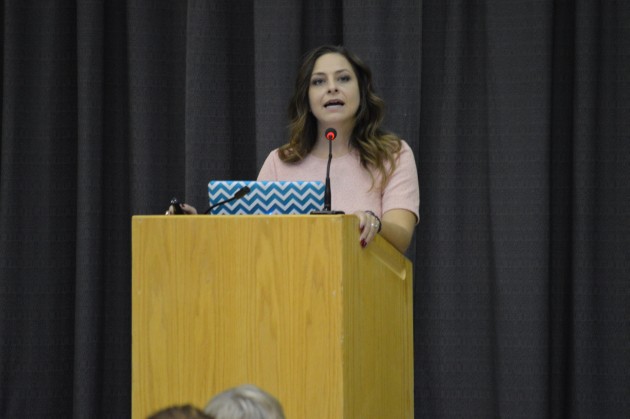DPAC Conference Focuses on Several Issues
Prince George, B.C. – Parents and delegates from across the region gathered at the Civic Centre on Saturday for the District Parent Advisory Council conference.
The conference provides an opportunity for both PAC volunteers and the general parent population to get further education on a variety of subjects that help both PACs and parents.
The keynote speaker, psychologist Dr. Vanessa Lapointe, discussed ways to grow resilience in children and allow them to become the best that they can be. She says that requires the laying of infrastructure to meet a child’s requirements to grow up in the best possible way.
Dr. Lapointe says resilience is determined by risk factors, protective factors involving their relationship with the adults in their lives and adaptability. She says adaptation encompasses multiple perspectives, perseverance, confidence in a soft landing and directing energy to growing.
The day-long conference included several workshops on everything from how not to be effective in advocating for children in a school setting to kids and drugs, weaving aboriginal perspectives into the curriculum to the mental health of children.
DPAC chair Sarah Holland says “some ways are effective and some not effective in advocating for kids because, oddly enough, going on social media first tends not to be as useful with the school as you might suspect.” She says “you see parents sometimes advocating through the use of social media or things that are very difficult for the district to respond to.”
She says some parents will post on social media that “so and so teacher is just a horrible, horrible person, she did this to my kid and that kid did that and they won’t even tell me what happened to this kid here.” Holland says that makes it impossible for the district to get involved. “They can’t reply to that, they can’t make that sort of thing public.”
“So you don’t have the district being able to respond and things can build up and reputations can be destroyed. When we’re talking about how to advocate for your kids when there is an issue there are some ways that work well, and one of them is talking to people.” She suggests making an appointment and dealing directly with the person who the issue is with, whether a teacher or staff member.
“If that doesn’t get you anywhere or if that’s not an area where people are comfortable, then go to the principal for example.” She says making an appointment works well “because these people are actually really busy a lot of the time and they don’t want to be discussing your personal, private situation in a busy hallway.”
Holland says “we’re all on the same team, we’re all on the team on the side of the kids. The school is there to support your child, you’re there to support your child. Sometimes we’re going to disagree but we’re not on opposing sides.”
Asked whether social media is a help or hindrance in terms of our childrens’ education Holland says “it is what it is, it’s here to stay. It could be used for good, it can be used for evil.” So is it being found in the schools that it’s a bit of both? “Yes,” says Holland, “I think that’s probably a good way of putting it, yes.”
“If we use it for communication, for building community, then that something that social media can be really good at. If we use it for divisiveness, for trying to get other people into trouble, it can also be used for that.”
Holland says bringing aboriginal aspects into the curriculum is developing rapidly. “You’re going to be seeing some changes to the province-wide curriculum that weave the aboriginal perspective throughout the curriculum. That’s something that this district has been working on for a number of years.”
“As a school system we’ve got two issues: one is that we haven’t been doing a great job with our aboriginal students and having our aboriginal students progress through the entire school system and serving their needs as they could be. That’s something that’s being looked at and addressed. I hope it’s getting better.”
“The other area is knowing about the aboriginal experience, the history, the culture is something that every resident of B.C. should know about, including the kids in our schools. I think it’s terrific that the curriculum, now as it’s forthcoming, very definitely includes parts of the residential schools.”
She says “there will be aboriginal support workers in a school that help an entire school through gaining some experience and knowledge, understanding and cultural awareness.”


Comments
Comments for this article are closed.